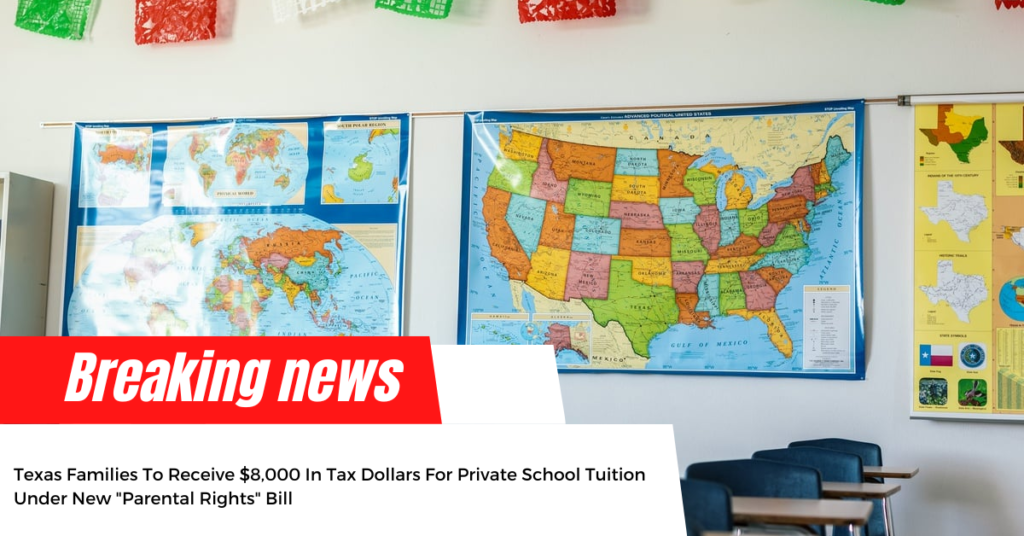A comprehensive education bill introduced late Friday in the Texas Senate would allow families to use taxpayer funds to send their children to private schools, create new opportunities for parents to review curriculum, and impose new rules on how gender and sexual orientation are taught in all grades.
Senate Bill 8 would, if signed into law, provide families with up to $8,000 in taxpayer funds per student to pay for private schooling through an educational savings account, enshrining Lt. Gov. Dan Patrick’s signature educational proposal.
Patrick’s efforts have previously been rejected. Rural Republican lawmakers have traditionally opposed similar legislation, claiming that it siphons money away from public schools, which are often the lifeblood of their rural communities. However, this year’s bill exempts smaller districts, with school districts with fewer than 20,000 students receiving full funding for the first two years. Every year, Texas schools receive a base allotment of $6,160 per student.
Larger districts in urban areas with a higher concentration of private schools risk losing state funding, which is calculated based on average student daily attendance. The provision for savings accounts is part of the legislation’s broader theme of parental rights, which Republicans have seized on since the COVID-19 pandemic shutdowns temporarily closed schools.
You might also like to read:
- Texas Mother Charged With Child Neglect After Allegedly Abandoning Kids
- Texas Police Seek Public Help In Solving Model Murder
Conservatives have pushed for a variety of changes to the way classrooms are run in the three years since. Texas has already set limits on how topics like race and slavery are taught. The legislation puts gender identity and sexual orientation lessons in a new light. It is similar to a highly contentious law in Florida.
According to the bill’s language, schools are prohibited from teaching such lessons to any grade level that are not “age-appropriate or developmentally appropriate.” For families to review instructional materials, schools must establish so-called parent portals. Parents would also have the authority to exempt their children from gender and sexual orientation education.
A page on Tweeter called Pastors for Children posted on tweeter related to the matter. You can see the Tweet below.
Gov @GregAbbott_TX’s voucher proposal is for affluent, white families already in private schools.
If it were not, he would hold his voucher rallies with poor families of color in inner city Dallas & Houston #txed public schools.
It’s wrong. The #txlege House must stop it now. pic.twitter.com/SezbPKsEtT
— Pastors for Children (@pastors4txkids) March 9, 2023
In addition, schools may conduct lesson reviews based on state guidelines to ensure teachers are following the law. Proponents of school choice have frequently cited sexual orientation and gender education as a key justification for withdrawing their children — and tax dollars — from public schools. The new legislation would allow them to do so while also prohibiting such teachings.
Any changes in their child’s mental, emotional, or physical health would also need to be communicated to parents. According to a news release from the bill’s author, Senate Bill 9 would also provide “across-the-board” pay raises for teachers, increase classroom funding, establish and fund mentor and teacher residency programs, and provide free pre-K education for the children of classroom teachers in districts where it is available.
What Did The Bill’s Author Say?
As per the news The bill’s author, state Sen. Brandon Creighton, R-Conroe, described the legislation in a statement as a compromise between “parents, educators, employers, and students.”
“Educating the next generation of Texans is the most fundamental responsibility we have, and I authored Senate Bill 8 to place parents, not government, squarely in the center of the decisions for their children,” he said. “Giving parents the power to determine the best school for their child will encourage competition and innovation, ensuring that each Texas student has the opportunity to succeed.”
Creighton also asked Texas Attorney General Ken Paxton for an expedited opinion on whether his bill, specifically its educational savings accounts provision, would violate the Texas Constitution by diverting public funds to private religious schools. Creighton questioned whether the related Texas constitutional provisions, known as the Blain Amendments, were “likewise unconstitutional,” citing recent U.S. Supreme Court decisions.
In addition, Angela Paxton, the attorney general’s wife, filed legislation earlier this week to repeal “the constitutional provision that prohibits the appropriation of state money or property for the benefit of any sect, religious society, or theological or religious seminary.”
Other news related to texas:
- Texas Youth Prisons: A Crisis Point Sparks Stark Choices For Lawmakers
- Texas Justice Served: Inmate Executed For Brutal Drug Robbery Murders
Catholic leaders said on Friday that Creighton’s bill raised serious concerns about religious freedom, particularly in relation to the Blain Amendments, which they claim stem from anti-Catholic bigotry. “It’s a good bill and a good start,” said Jennifer Allmon, executive director of the Texas Catholic Conference of Bishops. “This is an excellent way to start the conversation.”
Despite Patrick and Abbott’s support for taxpayer-funded private school scholarships, the bill’s future is uncertain. House Democrats and rural Republican colleagues have historically opposed legislation that would divert funds away from rural schools. It is unclear whether the bill’s additional funding for rural schools will be enough to win support in the lower chamber this year.
A school district with fewer than 20,000 students would receive $10,000 per year for the first two years for each student who uses education savings accounts, according to the bill.
If you liked reading this article then make sure to bookmark our website kerrvillebreackingnews.com for more future updates.

